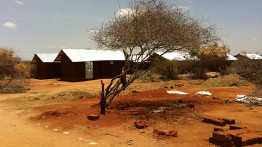Student Lecture Series | Anooradha Iyer Siddiqi: Insurgent Domesticities
Thursday, November 5, 2020, 6:30 - 8:30pm

Anooradha Iyer Siddiqi: Insurgent Domesticities
This event will be conducted through Zoom. Please register in advance here. Zoom account registration is required.
Research for this lecture was undertaken in the refugee camps at Dadaab, Kenya. Professor Siddiqi would like to thank the many refugees and aid workers whose time, care, ideas, and insights contributed to this work.
‘Home’ has been used as a boundary-forming device to identify, homogenize, normalize and exclude. Composed of family and nation, and attendant notions of their sanctity, ‘home’ is no longer open to reinterpretation and reconfiguration; it is pressured as a lived space. Insurgent Domesticities brings into focus the insurgent environments, objects, and practices that make up the maintenance, creation, labor, and intimacies of home. Our collective investigates the more processual aspects of domesticity, to interrogate the politics of ‘home,’ through histories of solidarity, disobedience, stealth, and militancy, from the scale of the clothesline to that of the state.
Anooradha Iyer Siddiqi is an Assistant Professor of Architecture at Barnard College, Columbia University, and co-editor of “Feminist Architectural Histories of Migration” (2020) and Spatial Violence (2016). Her book manuscript Architecture of Migration: The Dadaab Refugee Camps and Humanitarian Settlement analyzes the history, visual rhetoric, and spatial politics of the Dadaab refugee camps in Northeastern Kenya. It moves beyond ahistorical representations of camps and their inhabitants to find long migratory and colonial traditions in the architecture and iconography of refugees and humanitarians, particularly those engaged in homemaking.
Her book manuscript Minnette de Silva and a Modern Architecture of the Past engages the intellectual and heritage work of a singular figure in the history of Ceylon/Sri Lanka and one of the first women in the world to establish a professional architecture practice, responsible for house and housing designs in the new nation, and thinking and teaching on domesticity during the civil war.
This lecture and discussion is free and accessible to the public.
View the full Fall 2020 Lectures and Events List.




